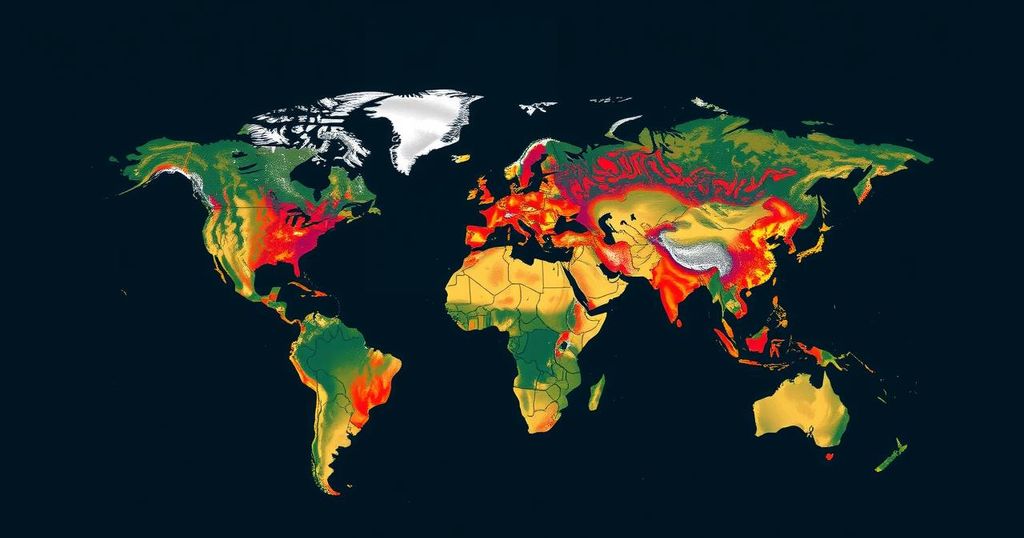Urgent Health Risks Linked to Climate Change Unveiled by New Report
A newly released report indicates that climate change is posing unprecedented health risks globally, with key indicators showing alarming increases in heat-related deaths, the spread of diseases, and food insecurity. Ten of fifteen monitored indicators have reached concerning records. Despite some improvements, the overall message is a dire call for immediate action to mitigate health impacts and transition towards sustainable practices in light of escalating environmental challenges.
A significant report released recently highlights the escalating health threats posed by climate change, emphasizing that the consequences of inaction are being felt in lives lost. As the world endures unprecedented climatic events—including heatwaves, wildfires, hurricanes, droughts, and floods—2023 is anticipated to set a new record as the hottest year to date. Coinciding with this alarming trend are the forthcoming United Nations COP29 discussions in Azerbaijan and a U.S. election that may see the return of climate change skeptic Donald Trump to the presidency. The Lancet Countdown’s eighth report on health and climate change represents the joint efforts of 122 experts, including those from prominent UN bodies such as the World Health Organization. The findings paint a grim picture, revealing that among the 15 tracked indicators, 10 have reached alarming new highs. Key concerns include a sharp rise in extreme weather phenomena, an alarming increase in heat-related fatalities among the elderly, the proliferation of infectious diseases, and escalating food insecurity due to crop failures from climate-related events. Marina Romanello, the executive director of Lancet Countdown, stated that the report unveils “record threats to the health and survival of people in every country, to levels we have never seen before.” Specifically, the report noted a staggering 167 percent increase in heat-related deaths among individuals over 65 since the 1990s. Additionally, expanding temperatures have facilitated the spread of diseases such as dengue, which recorded over five million cases in the past year. The report also underscored the alarming depletion of tree cover, with approximately five percent lost from 2016 to 2022, thus reducing the planet’s capacity to absorb carbon emissions. Furthermore, it criticized the fossil fuel industry and some governments for perpetuating climate change, with greenhouse gas emissions continuing to rise contrary to decades of warnings. Despite substantial profits, major oil and gas companies have increased fossil fuel production and received considerable subsidies, totaling $1.4 trillion in 2022, far exceeding commitments aimed at fostering a transition to a sustainable future. While the report highlights some positive strides, such as a nearly seven percent decrease in deaths due to fossil fuel-related air pollution and a doubling of renewable energy usage for electricity generation, the urgency for action remains critical. Romanello noted that health considerations have increasingly become a focal point in climate negotiations, underscoring the importance of collective action to safeguard the future against imminent dangers posed by climate change. She urged individuals to adopt climate-friendly practices, including sustainable diets, reducing carbon footprints from travel, supporting responsible financial institutions, and voting for proactive climate policies.
Climate change is increasingly seen as a significant determinant of public health, with its impacts being felt globally. Extreme weather events and shifting climate patterns are linked to health issues ranging from heat-related illnesses to the spread of infectious diseases. The urgency of addressing climate change has been repeatedly underscored by health experts and organizations, making reports like the Lancet Countdown crucial in framing these issues within the context of health risks. As countries prepare for international climate discussions, the collective acknowledgment of the connections between climate and health becomes increasingly essential for effective policymaking.
In conclusion, the recent Lancet Countdown report reveals alarming trends in health impacts due to climate change, signifying an urgent need for action. Despite some progress in reducing air pollution and increasing renewable energy, the overall situation is dire. Health threats are escalating globally, and the consequences of inaction are reflected in rising fatalities and disease spread. Collective efforts are necessary to mitigate these impacts, with a call for individuals to adopt sustainable practices and support policies aimed at combating climate change effectively, as the time for decisive action is critical.
Original Source: www.barrons.com




Post Comment